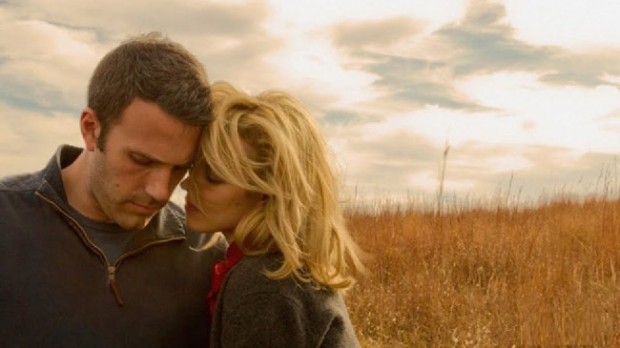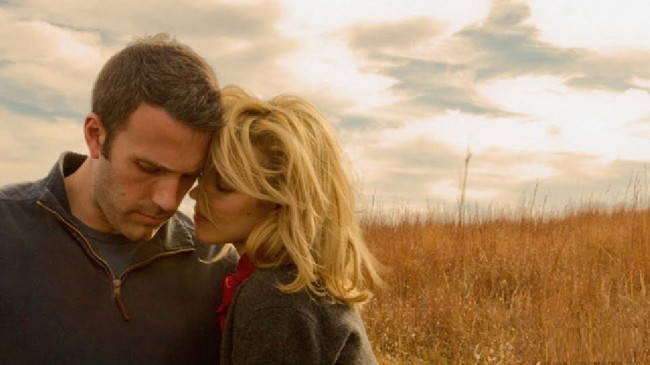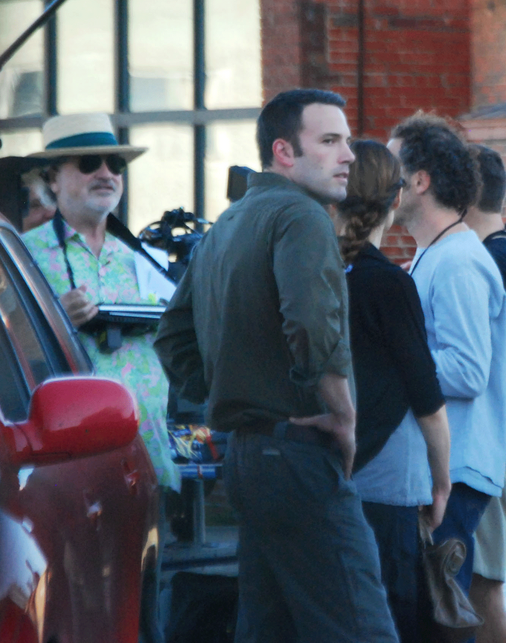
After unveiling just about everything you’d want to know short of seeing the film, people have actually witnessed Terrence Malick‘s To the Wonder as of this morning at the Venice Film Festival — and the reaction is as divisive as expected. Reviews indicate that Ben Affleck indeed just has a few spare lines as rumored, while his presence is reportedly in the backdrop, while Malick focuses on the women, most notably an always moving Olga Kurylenko. As for the film itself, reviews indicate Malick is moving in a more impressionistic, opaquely religious direction from The Tree of Life, but not as drastic as Affleck revealed this weekend.
We’ll weigh in come TIFF time, but for now check out the full reviews, followed by Twitter impressions. And as for when audiences will get to see the film, 01 Distribution confirms a December 14th Italy release for the film. Hopefully US distribution comes along quickly with a release around the same timeframe.
Perhaps there is a hidden rhythmic and thematic structure behind the facade of To the Wonder that has to do with the coming and going of seasons and emotions, the rise and fall of relationships, the difficulty of sustaining love and faith and so on, all connected to the use of music and the echoing of voice-over. If so, however, it doesn’t assert itself meaningfully during the act of watching a film that seems drained of life and ideas rather than sustained by them.
“To The Wonder” feels like a film about absence, about longing, or “thirsting,” as Javier Bardem’s character puts it at one point. Marina longs for her lover, longs for her daughter when she’s away, longs for a reaction from the distant Neil as their relationship becomes strained. Neil, meanwhile, is always looking for something else – a classic grass is greener type, torn between Marina and Jane, loving both, but unable to decide. And Quintana wander the rougher parts of town, thirsting for a sign that God is listening to him in a world with so little evidence that his Lord exists. They’re all characters with a void in their existence (like Penn in “The Tree Of Life”), and it hit us on something of a gut level.
At its best, Malick’s cinematic rhapsody is glorious; during his uncertain moments, he appears to be repeating himself. But what delight there is in this film.
“To the Wonder” is structurally a more modest, more linear film than “Tree” — no dinosaurs here, folks, though fans of sea turtles should prick up their ears — but it’s no less vulnerable to charges of excessive preciosity, particularly from those whose secularity applies to churches beyond the House of Malick.
Terrence Malick continues to take bold risks, courting ridicule and rapture in equal measure, with “To the Wonder,” his first full-on treatment of that oldest of movie subjects, romantic love. Staying in the semi-autobiographical vein of “The Tree of Life,” the suddenly industrious writer-director finds tenderness and beauty in a whisper-thin story of passion, marriage and betrayal that all but erases the line between the secular and the sacred. Those who can’t abide Malick’s spiritual reveries will steer clear, but flaws and all, this is ravishing, distrib-worthy work from a filmmaker who hasn’t lost his capacity to move and surprise.
Time:
At 112 minutes Malick’s shortest picture since the 1978 Days of Heaven, To the Wonder could also be called the longest experimental art film ever. This is a test, requiring rapt concentration and acute attention, and repaying a hundredfold. For spectators dulled by the midget movies of an arrtstically timid era, the film may be a chore. For those on Malick’s rarified wavelength, it’s a wonder.
Malick is a revered cinematic poet, deservedly so, and striving for lyrical transcendence on screen is his worthwhile ambition. But it’s not a get-out-of-jail-free card either. “To The Wonder”, to me, played like a slighter (and more repetitive) version of “The Tree Of Life” in most respects, its flowing, exquisite imagery and elegant soundscape certainly pleasing to the eye and ear but the moves and motives of its sketchy characters failing to offer enough substance to nourish the spirit. At one point, Marina’s daughter observes as her mother continues her very long wait for Neil to pop the question, “There’s something missing here.” She’s not wrong.
While the traditional end-of-love story left viewers unsatisfied, the more moving parts of the film were the exploration of divine love and natural beauty, like the warming light felt by Bardem through a stained glass window.
Of course, as with any of Malick’s offerings, both the music and cinematography are undeniably breathtaking – but even this beauty, this wonder, has now transcended into cliché. Malick’s extreme concentration on capturing the magic hour neglects the 23 other hours. Potentially interesting sub-plots – Affleck’s Neil seems to have some kind of job, Bardem’s Samaritan-like work with the poor – are abandoned for sunsets and sunrises. The ‘sublime’ is supposed to surprise, rather than simply being timetabled. It remains to be seen whether To the Wonder is a misstep, or the sad decline of a once fantastically innovative filmmaker, lost in the limitations of his own inimitable style.
After The Tree Of Life, Terrence Malick continues his slow wade into the mystic swamp in To The Wonder, shedding vain and distracting directorial possessions like character, dialogue, acting and story along the way in order to focus on the cosmic universals – though this time with a more overtly Christian flavour. It may be that we’re being taken into a dream life of remembered fragments here, or perhaps a series of flashbacks in the instant before death, played in extreme slow motion.
TO THE WONDER Syrupy and symphonic. A twig snapped straight off TREE OF LIFE. Affleck okay. Kurylenko’s character v. annoying.
#Venice2012— Adam Woodward (@AWLies) September 2, 2012
The usual storm of sneering, jeering and booing, I’m afraid, for Terrence Malick’s flawed, passionate, idealistic To The Wonder
#Venezia69— Peter Bradshaw (@PeterBradshaw1) September 2, 2012
TO THE WONDER (B+) Malick’s Tree of Love, at once less substantial and more satisfying than its predecessor. A thousand Christina’s worlds.
— Guy Lodge (@GuyLodge) September 2, 2012
Malick’s To the Wonder had me – until the turtle. And the bison.
#venezia69— Jason Solomons (@JasonCritic) September 2, 2012
TO THE WONDER (6/10). Malick-by-numbers? Oppressively virtuoso god-bothering mega-haiku of enchantment at dusk.
#venezia69— Neil Young (UK) (@JigsawLounge) September 2, 2012
To The Wonder by Terrence
#Malick is nothing more than atrocious left-overs of Tree of Life. Like a big “f** you” to the audience#venezia69— Beatrice Behn (@DansLeCinema) September 2, 2012
To the Wonder: gorgeous, crawling offshoot of Tree of Life. Problem: hard to give a toss abt stolid Affleck & pouting Kurylenko
#venezia69— Xan Brooks (@XanBrooks) September 2, 2012
T Malick’s To The Wonder: God that was boring
— Damon Wise (@yo_damo) September 2, 2012
The new Malick To the Wonder:greatAmbition, insightful touching moments. But a cinematic experience you would not inflict on a friend.
— Mick LaSalle (@MickLaSalle) September 2, 2012
To The Wonder: A love story without story, love or any kind of emotions. It’s show without tell. Thanks again Terrence Mallick… I guess.
— dōmenikº (@doomeniko) September 2, 2012
To the Wonder very disappointing
#Venice69 Malik does melodrama and makes his truly bad film— John Bleasdale (@drjonty) September 2, 2012
Malick’s TO THE WONDER gets a mixed reception at
#Venezia69. Exquisite, oddly balletic and sometimes like a Hillary’s Blinds commercial.— Kate Muir (@muirkate) September 2, 2012
To The Wonder (T. Malick) ****1/2
#cinevoti#venezia69— Fabrizio Ciavoni (@TerryKyno) September 2, 2012
Terrence Malick, what happened? “To the Wonder” a disappointing survey of love, with lead actress an ex-model…letdown.
#venezia69— Farah Nayeri (@fnayeri) September 2, 2012
Full review of To The Wonder coming, but for now 1) Ben Affleck was exaggerating a fair bit & 2) I liked it more than Tree Of Life.
— olilyttelton (@olilyttelton) September 2, 2012
To the Wonder is The Tree of Love – similar wispy, whispery musings applied to dull marriage drama. Can’t reason away God factor this time.
— Dave Calhoun (@davecalhoun) September 2, 2012
To the Wonder has its moments though not many; how many twirling skirts at sunset do you need?
#venice2012— Nick James (@filmnickjames) September 2, 2012
TO THE WONDER has a few good moments but otherwise it depends how many pouts and pirouettes in the hayseed sunset you can take
#venice2012— Nick James (@filmnickjames) September 2, 2012
#venezia69#venice69 Terrence Malick’s TO THE WONDER: the Tree of Life leftovers are predictably laughable and unwatchable. A true disaster.— Marco Duse (@marcoduse) September 2, 2012
To the Wonder will also show at Toronto International Film Festival, but has no distribution yet.


